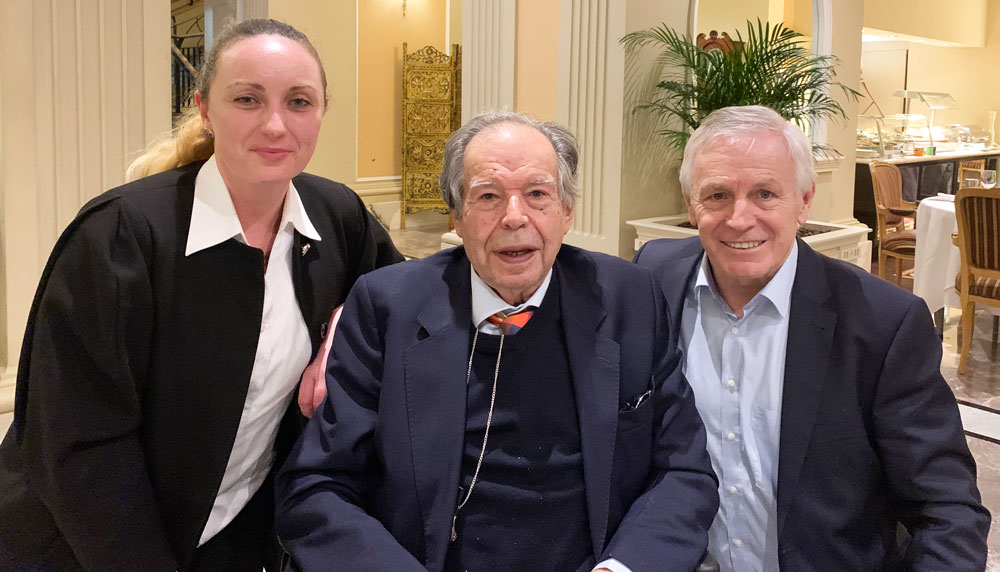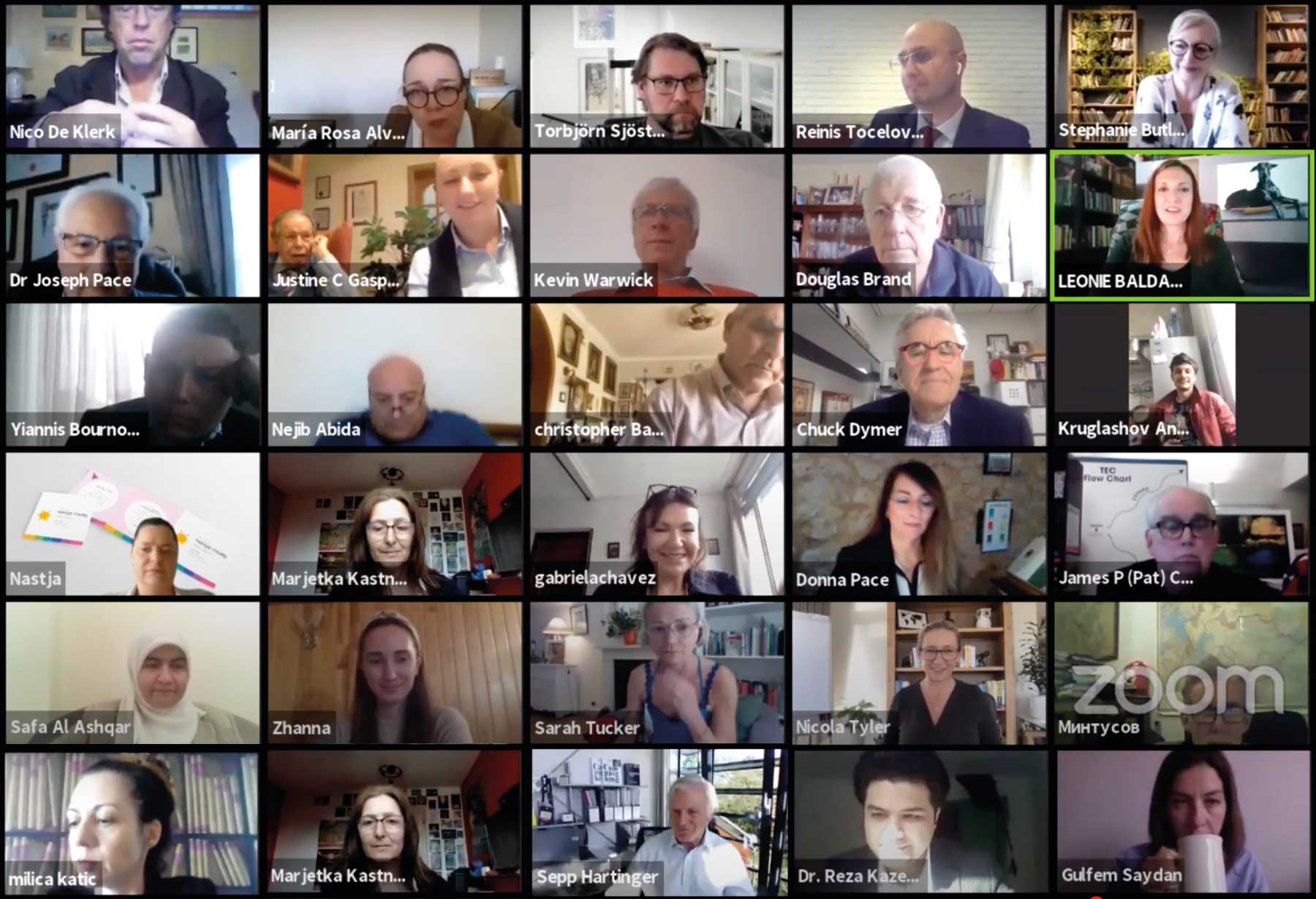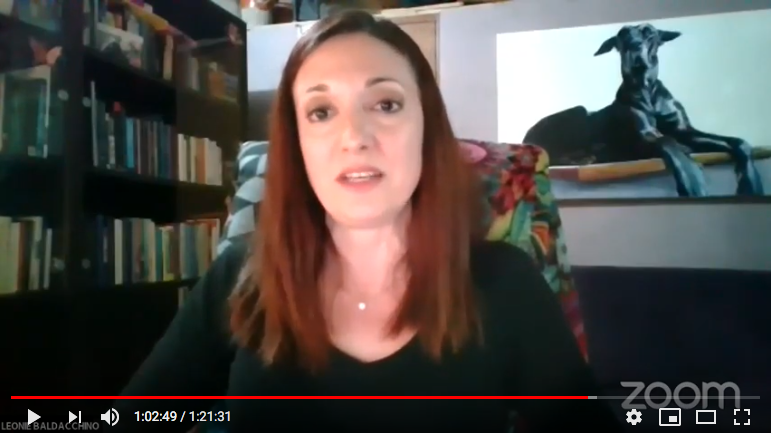

EAPC and “Palace of Thinking” developing
alternative approaches to alleviate the covid-19 crisis
“Are the measures taken by governments against covid-19 worldwide the only right ones or are there alternatives approaches to dealing with the crisis?” This question was the focus of a discussion between Dr. Edward De Bono, the inventor of lateral thinking, Justine Cassar Gaspar from the life academy Malta and EAPC founder Sepp Hartinger.
At the end of an extensive discussion, the decision was made to find alternative answers to this question as part of a worldwide video conference. In coordination with EAPC president Igor Mintusov, a cooperation project between EAPC and the De Bono platform “Palace of new Thinking” was created for the first time in EAPC history. The coordination was in the hands of Justine Cassar Gaspar, since March 2020 also member of EAPC and Sepp Hartinger.

Picture before the covid-19 crisis • from left to right: Justine Gaspar, Dr. Edward De Bono, Sepp Hartinger

The participants of the EAPC/PONT Videoconference
Conference recorded
The entire video conference was recorded and is available under https://youtu.be//FF46Xgnhszg.

Video conference with participants
of 22 nations
After extensive preparations, a video conference lasting over four hours took place, in which no fewer than 35 experts with a wide range of professional background from 22 countries took part. Including no less than 18 members of the EAPC.
As part of the conference, which was under the patronage of the Maltese president, chairing by master trainer and prudent management by Dr. Leonie Baldacchino from De Bono Institute of Malta university developed fist approaches, which were then deepened in the expert panel.
Here are the main approaches of the conference:
Alternative approaches to covid-19 global management
As part of a joint project by „Palace of new Thinking“ and the EAPC, the European Association of Political Consultants, the following alternative approaches to managing the covid-19 crises were developed in a world video conference lasting several hours with participants from Sweden, Kazakhstan, Russia, Ukraine, Germany, Latvia, Austria, Croatia, Italy, South Africa, Spain, UK, Peru, Portugal, Jordan, Turkey Slovenia, Serbia, Greece, Tunisia, USA and Malta.
The alternative proposals are supplemented with further approaches that were received after the conference.
Focus 1:
MANAGEMENT OF THE CURRENT CRISIS
- Quarantine for districts with covid-19 hotspots, “normal life” with clear rules of conduct for the rest of the countries
- From the UN to the WHO, continental associations like EU, national states, federal states, districts and municipals
- Structuring of the crisis team according to the same rules worldwide
- Integration of all political parties, as well as health care experts and representatives of the respective target group
- Population must be informed about the local situation
-
- Information with clear facts
- Much more involvement of the municipalities in the information activities
- factional education instead of spreading fear
-
- Common rules on how to live a “normal life” despite a global crisis
Focus 2:
AVAILABILITY AND ADEQUACY OF HEALTH CARE
Solidarity instead of nationality
- Medical cooperation across borders
- Development of multinational medical teams that can be called up immediately if required (In Italy Russia, Albania and Cuba helped but nobody from the EU. That’s a shame.)
Establishment of production units in every country worldwide
- That can immediately provide protective equipment in the event of a crisis
Advance joint research against covid-19
Instructions for self-made protective clothing in an emergency
Define risk groups and protect them individually
Focus 3:
HOW TO EASE THE EFFECT ON THE ECONOMY
- Each country must bear the full amount for the damage caused by restrictions
- Public support programs in connection with climate protection goals
- Crisis teams must also be aware of the economic consequences of their decisions
- Setting up special working groups to control expenditure
Focus 4:
INDEPENDENT THINKING
- Cooperation with all other countries
- Development of alternative ideas for all areas of life
- Development of contra positions in order to achieve new and unique results
- Much more competences at world organizations like UN or WHO and rules according to which countries should act in crisis
- New role of the world bank as financer of the crisis management
- Honest communication via digital channels
- Exchange of experiences and ideas
- Mutual help, for example through personal sponsorships
Focus 5:
PRACTICALITY, ACCEPTANCE AND ACTION
- Every regulation by law instead of minister regulation
- Compliance with democracy and human rights, especially in times of crises
- Partnership with neighborhood countries acting together, helping each other
- Combine every decision for restriction with a solution after the crisis
- Critical evaluation of all decisions worldwide in order to learn for future crisis
The approaches developed we communicated to all participants with the request for forwarding to the crisis teams of the governments.
Conference recorded
The entire video conference was recorded and is available under https://youtu.be//FF46Xgnhszg.
Once again, a big thank you to everyone who was there.
© 2025 - EAPC | Aneeq WordPress Theme By A WP Life | Powered By WordPress.org
You need to load content from reCAPTCHA to submit the form. Please note that doing so will share data with third-party providers.
More InformationYou are currently viewing a placeholder content from Facebook. To access the actual content, click the button below. Please note that doing so will share data with third-party providers.
More InformationYou are currently viewing a placeholder content from Instagram. To access the actual content, click the button below. Please note that doing so will share data with third-party providers.
More InformationYou are currently viewing a placeholder content from X. To access the actual content, click the button below. Please note that doing so will share data with third-party providers.
More Information
